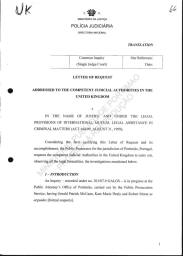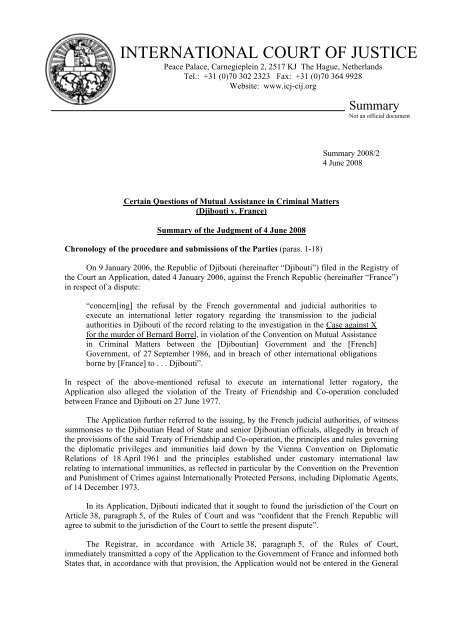The Process Involved in Filing Letters Rogatory: A Step-by-Step Guide
The Process Involved in Filing Letters Rogatory: A Step-by-Step Guide
Blog Article
Letters Rogatory Explained: Facilitating Legal Teamwork In Between Countries

Meaning of Letters Rogatory
Letters rogatory are official requests made by a court in one jurisdiction to a court in an additional territory, seeking help in obtaining evidence or statement for a lawful case. This procedural mechanism is essential in the context of worldwide regulation, where legal systems may vary, and cross-border cooperation is required. Letters rogatory promote the gathering of info that might be critical for adjudicating situations, specifically in circumstances involving complex multinational concerns.
Typically, these requests occur in civil, criminal, or management issues where an event calls for evidence that lies outside the jurisdiction of the requesting court. The letters function as a way to make sure that the concepts of due procedure are promoted, making it possible for courts to access evidence that might otherwise remain inaccessible because of legal or geographic barriers.
The use of letters rogatory is governed by global treaties, reciprocal arrangements, or residential regulations, which mark the treatments and commitments of the courts entailed. It is essential to keep in mind that the implementation of such demands is not ensured; they depend upon the legislations and methods of the jurisdiction receiving the letter. Thus, letters rogatory are a pivotal device for cultivating lawful collaboration and guaranteeing justice across boundaries.
The Refine of Issuing Letters Rogatory
Issuing letters rogatory involves a structured process that makes sure conformity with both international and residential lawful criteria. At first, the requesting party, typically a court or lawful authority, prepares a formal demand describing the nature of the support sought, the proof or info needed, and the lawful basis for the demand. This file has to be exact to help with understanding by the international jurisdiction.

The following step includes transferring the letters rogatory to the designated foreign authority. This is frequently done through diplomatic channels or international lawful aid structures, making certain that the demand is obtained and recognized by the international court. The foreign court after that refines the demand according to its very own lawful treatments, inevitably reacting to the requesting party with the desired details or proof, thus helping with international lawful participation.
Value in International Legislation
The importance of letters rogatory in international legislation can not be overstated, as they function as a crucial device for judicial teamwork across boundaries. These formal requests for aid in legal issues enable courts in one jurisdiction to look for information, proof, or the existence of witnesses from another territory, thus promoting the administration of justice in transnational instances.
Letters rogatory are particularly vital in the context of globalization, where legal disagreements usually cover multiple countries. They make it possible for the collection of evidence that could or else be inaccessible, making sure that lawful procedures are educated and fair. By cultivating collaboration in between judicial systems, letters rogatory help maintain the regulation of legislation and advertise mutual respect amongst nations.
Furthermore, making use of letters rogatory demonstrates a commitment to global norms and principles of participation, reflecting the interconnected nature of contemporary lawful practices. It shows the value of sticking to established treatments and treaties, such as the Hague Convention, which offers a structure for these requests - Letters rogatory. Ultimately, letters rogatory improve the efficiency of lawful processes, guaranteeing that justice Visit Your URL is not prevented by geographical boundaries
Challenges and Limitations
In spite of their value, letters rogatory face numerous challenges and limitations that can hinder their performance. One primary issue is the varying legal frameworks and treatments throughout territories, which can cause misconceptions and hold-ups in the implementation of demands. Various nations might have distinctive needs for the validity of letters rogatory, complicating the procedure further.
Furthermore, the usually lengthy nature of international lawful cooperation can hinder timely accessibility to proof or witnesses. This hold-up might detrimentally influence ongoing investigations or lawful process, especially in cases requiring read the article immediate activity. In addition, the absence of sources and training in some jurisdictions can result in insufficient handling of requests, bring about insufficient or insufficient reactions.
Social distinctions and varying attitudes towards legal processes can also position substantial obstacles. Nations with less official legal systems might have a hard time to comply with the procedural roughness expected in letters rogatory. Last but not least, political stress between countries can affect the determination to implement requests, resulting in a lack of teamwork and diminishing the utility of this system in global regulation. These obstacles require continual discussion and reform to improve the efficacy of letters rogatory in legal participation.
Case Studies and Examples

Alternatively, difficulties can develop, as seen in a case entailing a European nation looking for evidence in a continuous criminal issue from a non-EU country - Letters rogatory. The process was postponed as look at this website a result of bureaucratic hurdles and varying legal requirements, eventually impeding the examination
These instances illustrate that while letters rogatory can promote worldwide cooperation and quicken lawful proceedings, they likewise highlight the requirement for clear communication and understanding of lawful frameworks between countries. Such study highlight the relevance of refining this tool to enhance efficiency and effectiveness in worldwide lawful matters.
Conclusion
In recap, letters rogatory serve as a vital device for assisting in legal cooperation in between nations, guaranteeing the collection of evidence and testament across jurisdictions. Their value in worldwide law can not be overemphasized, as they advertise due process and enhance the efficiency of cross-border lawful procedures.
Letters rogatory are formal demands made by a court in one jurisdiction to a court in another territory, seeking aid in acquiring proof or statement for a legal case. The requesting event, usually a court or legal authority, prepares a formal demand detailing the nature of the help sought, the evidence or details needed, and the lawful basis for the request. The international court then refines the request according to its very own legal treatments, ultimately responding to the asking for party with the desired information or proof, thus assisting in international legal participation.
Furthermore, the usage of letters rogatory demonstrates a commitment to global norms and principles of teamwork, reflecting the interconnected nature of contemporary lawful practices.Worldwide lawful participation through letters rogatory is not without its real-world ramifications, as highlighted by various situation researches that highlight both successes and challenges.
Report this page